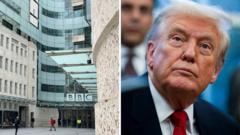Will the BBC Director General Calm the Storm After Trump's $1 Billion Threat?

Published: 2025-11-11 10:00:20 | Category: technology
Tim Davie's upcoming address to BBC staff follows Donald Trump's threat to sue the corporation for $1 billion (£760 million) over alleged misleading edits in a Panorama programme about his speech on 6 January 2021. This controversy stems from a leaked memo claiming the programme spliced two parts of Trump's speech, creating the impression that he explicitly incited the Capitol riot. The BBC is expected to respond to Trump's demands for a retraction, which could have significant implications for the organisation's reputation.
Last updated: 31 October 2023 (BST)
What’s happening now
As the situation unfolds, Tim Davie, the outgoing director general of the BBC, is set to address staff amid rising tension over the network's editorial choices. Trump's legal team has issued a stern warning and demands for a retraction due to the way the Panorama programme presented his comments, which they argue misrepresented his intent. This ongoing controversy raises questions about media accuracy and the potential repercussions for the BBC's reputation and operations.
Key takeaways
- Donald Trump threatens to sue the BBC for $1 billion over alleged defamation.
- A leaked memo claims the Panorama programme misled viewers regarding Trump's speech on the Capitol riots.
- Tim Davie's resignation is linked to the growing scrutiny and controversy surrounding the BBC.
Timeline: how we got here
The following timeline outlines key events leading up to the current situation involving the BBC and Donald Trump:
- 6 January 2021: Trump delivers a speech inciting his supporters to march to the Capitol.
- 24 October 2024: The Panorama programme airing Trump's speech is broadcast.
- October 2023: A leaked internal memo criticises the Panorama programme for misleading editing.
- 29 October 2023: Trump's legal team threatens legal action against the BBC.
- 31 October 2023: Tim Davie addresses staff regarding the situation.
What’s new vs what’s known
New today/this week
Recent developments include Trump’s explicit legal threat to the BBC, demanding a retraction by Friday, and an internal memo's leak pointing to possible editorial failings. The BBC chair, Samir Shah, has labelled the editing as an "error of judgement," suggesting an acknowledgment of the issue at hand.
What was already established
The Panorama programme has been under scrutiny since its broadcast, with many critics arguing that the editing misrepresented Trump's speech. The BBC has faced ongoing accusations of bias and misrepresentation, a narrative that has intensified following the leaked memo.
Impact for the UK
Consumers and households
For the general public, this controversy could further fuel debates around media trustworthiness and freedom of the press. If the legal battle escalates, it may prompt discussions on how media outlets operate and their responsibility in reporting, potentially affecting public perception of news sources.
Businesses and jobs
The BBC's reputation as a reliable news source is vital for its operational integrity. This incident could impact advertisers and partnerships, leading to financial repercussions if public trust diminishes. The resignations of key executives signal deeper issues within the organisation that may affect staff morale and recruitment.
Policy and regulation
This controversy could lead to increased scrutiny from government bodies regarding the BBC's editorial practices, potentially influencing future regulations about media standards and accountability. The Culture Secretary's involvement signifies a possible shift in how the government interacts with the broadcaster.
Numbers that matter
- 1 billion: The amount Trump threatens to sue the BBC for, which raises questions about the feasibility of such a claim.
- 50 minutes: The time gap between the two segments of Trump's speech that were spliced in the Panorama programme.
- 365 days: The typical duration current affairs programmes are available on BBC iPlayer before removal.
Definitions and jargon buster
- Defamation: A statement that injures a third party's reputation.
- Splicing: The act of joining two pieces of film or audio together.
- Panorama: A long-running current affairs television programme produced by the BBC.
How to think about the next steps
Near term (0–4 weeks)
In the immediate future, the BBC may need to respond to Trump's demands for a retraction and navigate the fallout of its editorial decisions. This could involve legal consultations and public relations strategies to address the controversy.
Medium term (1–6 months)
Longer-term implications could arise regarding the BBC's editorial policies and how it manages content related to contentious political figures. A review of internal processes may be initiated to prevent future incidents.
Signals to watch
- Response from the BBC regarding Trump's legal threat and any potential retraction.
- Public reaction and media coverage of the situation following Davie's address.
- Outcomes of discussions in the Commons regarding the BBC's practices and policies.
Practical guidance
Do
- Stay informed about updates regarding the BBC's response to the legal threats.
- Engage critically with news content, considering different perspectives.
- Support independent media that prioritises ethical reporting.
Don’t
- Jump to conclusions without understanding the full context of the situation.
- Spread misinformation about the incident without verified sources.
- Ignore the implications of media bias on public trust.
Checklist
- Have you read multiple viewpoints on the BBC's actions?
- Are you aware of the timeline of events leading to the current situation?
- Do you understand the legal implications surrounding defamation claims?
- Have you considered the broader impact of media representation on society?
- Are you following the developments in Parliament regarding the BBC?
Risks, caveats, and uncertainties
This situation presents several uncertainties, particularly regarding the legal ramifications of Trump's threat. Media lawyers suggest that it may be challenging for Trump's team to pursue a case in the US due to jurisdictional issues. Additionally, the nature of public perception regarding media bias could evolve as the story unfolds, and attention should be paid to how the BBC manages its response to the allegations.
Bottom line
The unfolding drama surrounding the BBC and Trump's legal threats underscores the sensitive nature of media representation and its implications for accountability. As the situation develops, it will be crucial to monitor how the BBC navigates these challenges while maintaining its integrity and public trust.
FAQs
Why is Trump suing the BBC?
Trump is suing the BBC for $1 billion, claiming that the Panorama programme misrepresented his speech and defamed him by suggesting he incited violence during the Capitol riots.
What did the leaked memo reveal?
The leaked memo indicated that the Panorama programme misled viewers by editing Trump's speech in a way that could be interpreted as a direct call to action, raising concerns about editorial judgement.
What are the implications for the BBC?
The implications for the BBC include scrutiny over its editorial practices, potential loss of public trust, and the need for clearer guidelines to prevent similar controversies in the future.



